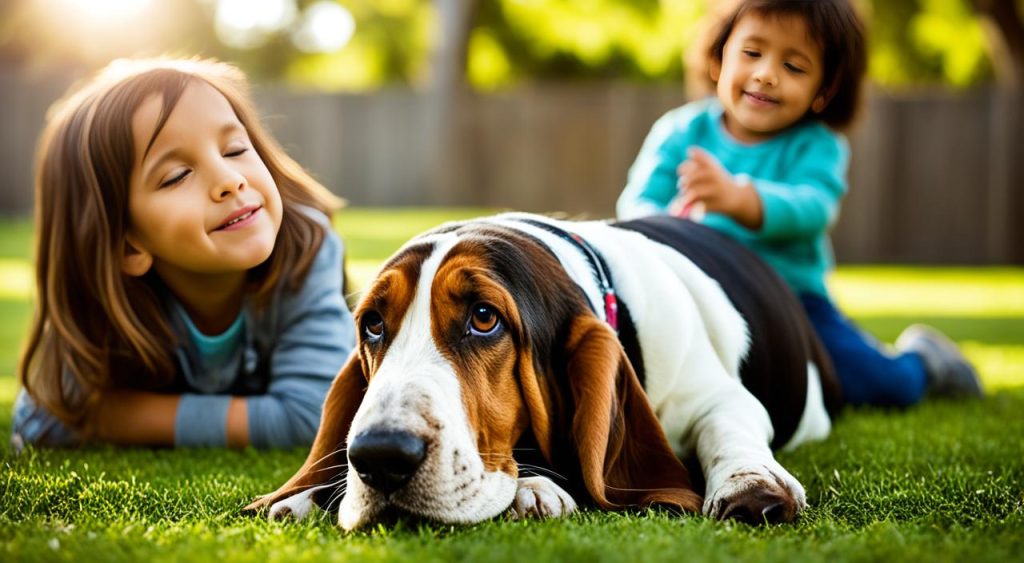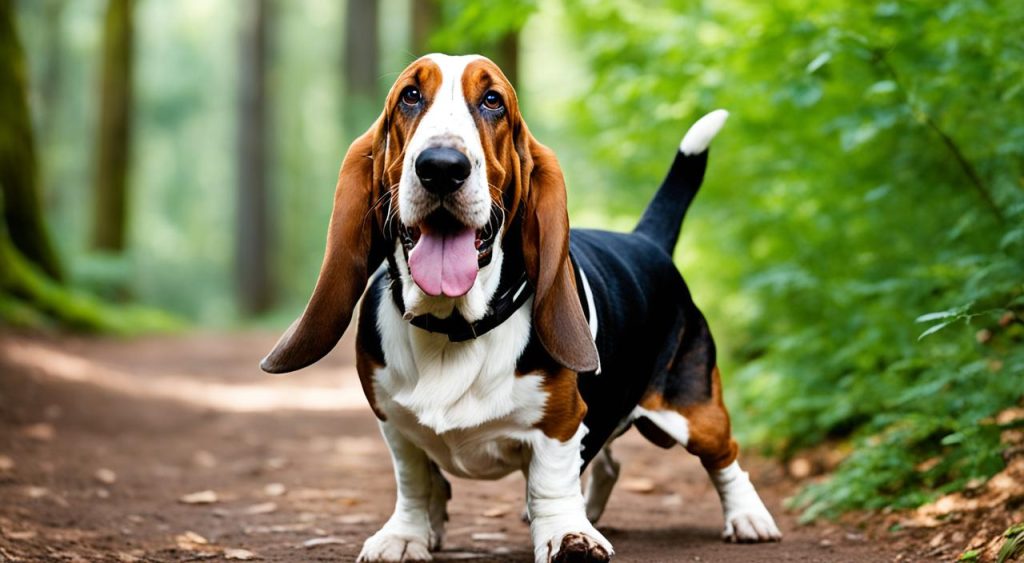Basset Hounds are often associated with a friendly and docile temperament. Despite being bred as hunting dogs, they are known for their placid nature and love for human and canine companionship. While aggression can be present in any dog breed, it is not a common trait in Basset Hounds. However, there are certain factors that can contribute to aggression in these dogs, such as lack of socialization, improper training, previous negative experiences, hunting instincts, and underlying health issues. It is important to address these factors and provide appropriate training and socialization to prevent aggression in Basset Hounds.
Key Takeaways
- Basset Hounds are generally friendly and non-aggressive dogs.
- Aggression in Basset Hounds can be caused by factors such as lack of socialization, improper training, and underlying health issues.
- Proper socialization and training are essential for preventing and managing aggression in Basset Hounds.
- Basset Hounds may exhibit aggression if they are in pain or discomfort due to health issues.
- Basset Hounds are not typically suited to be guard dogs due to their friendly and sociable nature.
The Temperament of Basset Hounds
Basset Hounds, bred as hunting companions, possess a natural affinity for both people and other dogs. Their friendly and sociable nature makes them excellent additions to a family. Though they may exhibit stubbornness at times, these dogs are generally docile and loyal. While Basset Hounds may not display as much overt affection as some breeds, their deep sense of loyalty to their families is undeniable. Their friendly and gentle disposition makes them well-suited for families with children of all ages.
Potential Causes of Aggression in Basset Hounds
While Basset Hounds are not typically aggressive, there are certain situations where they may exhibit signs of aggression. These can be attributed to various factors, including:
Lack of socialization: Basset Hounds that haven’t been properly socialized from a young age may feel anxious or threatened in new situations, leading to defensive aggression.
Improper training: Without consistent and positive training, Basset Hounds may develop behavioral issues, including aggression.
Learned aggressive behavior: If a Basset Hound has been exposed to aggressive or violent environments, they may learn and exhibit aggressive behaviors themselves.
Previous negative experiences: Basset Hounds that have experienced trauma or negative interactions with humans or other animals may exhibit aggressive behaviors as a result.
Influence of their hunting instincts: Bred as hunting dogs, Basset Hounds may display aggression towards small animals or when their prey drive is triggered.
It is important for Basset Hound owners to understand these potential causes of aggression and take appropriate measures to prevent its development. Providing early socialization and positive reinforcement training is essential to ensure that Basset Hounds grow up to be well-behaved and friendly dogs.
If you notice any signs of aggression in your Basset Hound, it’s crucial to address it promptly and seek professional help if needed. An experienced dog trainer or behaviorist can assist you in managing and correcting the behavior to ensure the safety and happiness of both your Basset Hound and those around them.
Preventing and Managing Aggression in Basset Hounds
To prevent and manage aggression in Basset Hounds, it is crucial to focus on proper socialization and training. Early and ongoing socialization is important to familiarize the dog with various people, animals, and experiences, reducing the likelihood of fear-based aggression.
“Socializing your Basset Hound involves exposing them to different environments, people, and animals in a positive and controlled manner,” says Dr. Sarah Johnson, a renowned dog behaviorist. “This helps build their confidence and teaches them appropriate ways to interact.”
Basset Hound socialization tips:
- Introduce your Basset Hound to new people, including children and individuals wearing hats or sunglasses.
- Take your Basset Hound to different environments, such as parks, beaches, and pet-friendly stores.
- Arrange playdates with well-behaved dogs of various breeds and sizes.
Positive reinforcement training techniques can be extremely effective when it comes to managing aggression in Basset Hounds. These methods focus on rewarding desired behaviors, such as sitting calmly, rather than punishing unwanted behaviors.
“Using reward-based training techniques, like treats and praise, creates a positive association and motivates your Basset Hound to perform the desired behavior,” advises dog trainer, Emily Anderson.
Basset Hound training tips:
- Start with basic obedience commands like sit, stay, and come.
- Use positive reinforcement, rewarding your Basset Hound with treats, praise, or toys for correctly following commands.
- Consistency is key – always use the same command and reward system.
It is essential for owners to be consistent, patient, and understanding when training their Basset Hounds. Remember that every dog learns at their own pace, and consistency is crucial for success.
“Training your Basset Hound should be a positive experience for both of you,” advises Dr. Johnson. “Remember to be patient and give your dog time to understand and respond to the training.”
If you are facing complex aggression issues or struggling with the training process, seeking the guidance of a professional dog trainer or behaviorist can be incredibly valuable. They have the expertise to assess your Basset Hound’s behavior, customize a training plan, and provide ongoing support to address any aggression-related concerns.
“A professional can help identify the underlying causes of aggression and develop a tailored training approach for your Basset Hound,” suggests Emily Anderson. “Their knowledge and experience can make a significant difference in preventing and managing aggression.”
By focusing on proper socialization, positive reinforcement, and seeking professional guidance when needed, you can prevent and manage aggression in Basset Hounds effectively. With consistent training and a nurturing environment, your Basset Hound can grow into a well-behaved, friendly, and happy companion.
Health Issues and Aggression in Basset Hounds
Basset Hounds are prone to certain health issues that can contribute to aggression. One common problem they face is ear infections, which can cause discomfort and pain. When a Basset Hound is not feeling well, they may become defensive and exhibit aggressive behavior as a way to protect themselves.
It is crucial for owners to be vigilant and recognize the signs of pain-related aggression in Basset Hounds. Some indicators may include growling, snapping, or biting, especially when touched or approached in certain areas. It is important to understand that this aggression is not the dog’s fault but rather a response to pain and discomfort.
If you notice any signs of pain-related aggression in your Basset Hound, it is essential to seek veterinary care promptly. A thorough examination by a veterinarian can help diagnose and address the underlying health issue causing the aggression. Treatment options, such as medication or surgery, may be recommended to alleviate the pain and reduce aggressive behavior.
To ensure the well-being of your Basset Hound and prevent aggression related to health issues, it is important to maintain regular veterinary check-ups and address any health concerns promptly. By providing appropriate treatment, you can help alleviate discomfort and create a safer and happier environment for your Basset Hound.
Basset Hounds as Guard Dogs
While Basset Hounds may be loyal and protective of their families, they are not typically suited to be guard dogs. Their friendly and sociable nature makes them more inclined to make friends with strangers rather than ward them off. Basset Hounds are not known for their alertness or aggressive behavior towards intruders. Therefore, if your primary goal is to have a guard dog, there are other breeds that are better suited for that role.
Conclusion
In conclusion, Basset Hounds are generally friendly and non-aggressive dogs. Their temperament is characterized by loyalty, sociability, and a docile nature. While aggression can potentially be present in any dog breed, it is not commonly found in Basset Hounds.
However, it is important for Basset Hound owners to understand and manage the factors that can contribute to aggression in these dogs. Proper socialization and training from a young age are crucial to prevent the development of aggressive behaviors. Additionally, addressing any underlying health issues promptly can help alleviate aggression related to pain or discomfort.
To ensure that Basset Hounds remain well-behaved and friendly family members, responsible ownership is key. This includes early socialization, positive reinforcement training, and regular veterinary care. By taking these steps, you can enjoy the loving and loyal companionship of a happy and non-aggressive Basset Hound.





